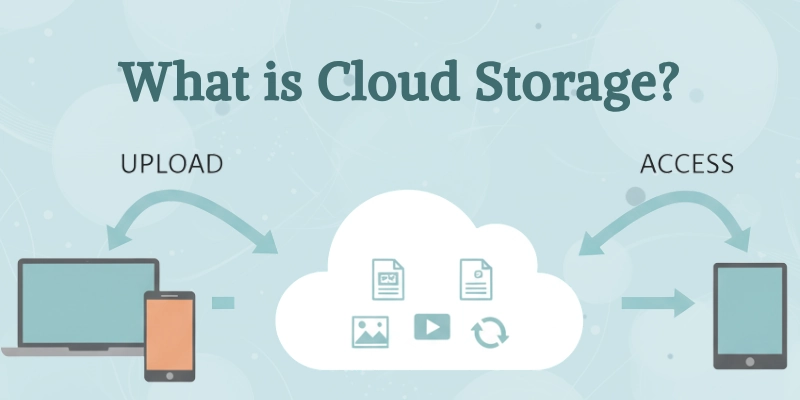What is Cloud Storage and How Does It Work
Published: 27 Sep 2025
Have you ever saved photos or files on Google Drive or iCloud? That’s cloud storage. It means keeping your data on the internet instead of only on your device. Think of it as an online locker where your files stay safe and easy to open anywhere with internet.
We use it daily, backing up contacts, saving documents, or sharing pictures. It saves space, protects data, and makes sharing simple.
This article will explain what cloud storage is, why it’s useful, and its pros and cons.
What is Cloud Storage?
In simple terms, it means saving files on the internet instead of only on your computer or smartphone. You can think of it as a digital locker that you can open from anywhere.

How Cloud Storage Works?
You upload a file → it is stored in remote servers → you can access it anytime using the internet. A simple way to imagine this is like keeping your clothes in a friend’s wardrobe and picking them up whenever you need.
Importance in Modern Life
Cloud storage is important in daily life because it allows remote access, gives a safe backup of files, and makes sharing quick and easy. It helps us keep our data secure while also saving space on devices.
History and Development of Cloud Storage
Cloud storage did not appear overnight. It grew slowly, from an idea in the 1960s to the advanced services we use today.
- The history of cloud storage started in the 1960s, when experts imagined storing data through a network. It was only an idea, but it became the base for future systems.
- In the 1990s, with the internet boom, the evolution of cloud storage began. Companies like AOL and CompuServe offered small online storage services.
- Today, services like Google Drive, Dropbox, iCloud, and OneDrive make cloud storage easy and common. People use them daily to save, back up, and share files from anywhere.
Types of Cloud Storage
There are different types of cloud storage designed for various needs. Some are open for everyone, while others are private or mixed.
Let’s look at the main ones.
- Public Cloud Storage:
Public cloud storage is shared by many users. Services like Google Drive and Dropbox are examples. It is easy to use, low-cost, and perfect for personal or small business needs. - Private Cloud Storage:
Private cloud storage is used by only one company. It offers more security and control but usually costs more than public options. This explains the public vs private cloud storage difference. - Hybrid Cloud Storage:
Hybrid cloud storage combines both public and private systems. Companies use it to balance security with cost and flexibility. - Community Cloud Storage:
Community cloud storage is shared by a group of users with similar needs, such as schools, hospitals, or research teams.
Features of Cloud Storage
When we talk about cloud storage features, we mean the main things that make it useful in daily life. Here is what cloud storage offers:
- Remote Access: You can open your files from anywhere with internet access.
- Automatic Backup: Files are saved automatically, so you don’t lose important data.
- File Sharing & Collaboration: Easy to share documents and work together with others in real time.
- Security & Encryption: Data is protected with security tools to keep it safe from hackers.
- Scalability: Storage space can grow as your needs increase.
Examples of Cloud Storage Services
There are many cloud storage examples we use every day. Some are free, while others offer paid plans with more space. Here are a few of the best cloud storage services.
- Google Drive:
Google Drive offers 15 GB of free storage. It is widely used for documents, photos, and videos. - Dropbox:
Dropbox is popular for easy file sharing and team collaboration. - Apple iCloud:
iCloud is built for Apple users, especially iPhone and iPad owners. - Microsoft OneDrive:
OneDrive is integrated with Windows and Microsoft Office, making it ideal for PC users. - Amazon Drive:
Amazon Drive connects with the Amazon ecosystem and works well for storing photos and files.
Uses of Cloud Storage
There are many uses of cloud storage in daily life. From personal needs to business work, it has become a helpful tool for everyone. Let’s look at the main applications of cloud storage.
- Personal Use:
People save photos, videos, and documents online to free up space and keep files safe. - Education:
Students and teachers share notes, assignments, and study materials easily. - Businesses:
Companies use cloud storage to keep large files, share data, and work in teams. - Backup & Recovery:
Cloud storage protects against data loss by creating safe backups. - Entertainment:
It allows streaming of music, movies, and games directly from the cloud.
Advantages and Disadvantages of Cloud Storage
Cloud storage makes saving, sharing, and backing up files easy, but it also has some drawbacks. Here’s a quick look at both sides.
| Advantages | Disadvantages |
| Access files from anywhere | Requires an internet connection |
| Automatic backup of data | Risk of data breaches/hacking |
| Easy file sharing & collaboration | Limited free storage |
| Saves space on devices | Subscription costs for more storage |
| Scalable storage | Dependent on the service provider |
Security in Cloud Storage
Cloud storage keeps our files safe, but security is important to understand. Many people ask, “Is cloud storage safe?” Let’s see how it works and what risks exist.
- Cloud storage uses encryption, passwords, and multi-factor authentication to protect your files. This makes it hard for hackers to access your data.
- Even with security, risks exist. Files can be hacked, leaked, or lost if the provider is not careful.
- You can stay safe by using strong passwords, choosing trusted cloud providers, and keeping backups of important files.
Following these steps improves cloud storage security.
Future of Cloud Storage
The future of cloud storage looks exciting as technology grows. Experts predict the next generation of cloud storage will be faster, smarter, and more secure.
- Cloud storage will handle more data and use AI to manage files efficiently.
- Smart devices like watches, cameras, and home appliances will connect directly to cloud storage.
- Prices may drop while security improves, making it easier for everyone to use.
- In the future, we may have near-unlimited storage options for personal and business needs.
Conclusion
Cloud storage means saving files on the internet instead of your device. It helps people and businesses access, share, and back up files easily.
While it needs internet and sometimes has limited free space, its benefits, like security and convenience, are huge.
Cloud storage is not just the future; it’s already part of our everyday life.
FAQs
Got questions about cloud storage? Check out these common FAQs to learn more!
Yes, cloud storage on your phone helps you save photos, videos, and files without using up device space. It also keeps your data safe in case your phone is lost or damaged.
To put things in cloud storage, upload your files using an app or website like Google Drive, iCloud, or Dropbox. Once uploaded, your files are saved online and can be accessed anytime.
If you run out of cloud storage, you won’t be able to upload new files until you free up space or buy more storage. Existing files will stay safe, but new backups or uploads will be blocked.
You can find your cloud storage by opening the app or website of the service you use, like Google Drive, iCloud, Dropbox, or OneDrive. Log in with your account, and all your saved files will be there.
Not always. Many cloud services offer free storage with limited space, but you need to pay for extra storage or advanced features.
No, cloud storage needs an internet connection to upload or access files. Some apps let you access files offline, but changes sync only when you go online.
You need cloud storage on your phone to save space and keep your photos, videos, and files safe. It also lets you access your data from any device, anytime.

- Be Respectful
- Stay Relevant
- Stay Positive
- True Feedback
- Encourage Discussion
- Avoid Spamming
- No Fake News
- Don't Copy-Paste
- No Personal Attacks

- Be Respectful
- Stay Relevant
- Stay Positive
- True Feedback
- Encourage Discussion
- Avoid Spamming
- No Fake News
- Don't Copy-Paste
- No Personal Attacks





